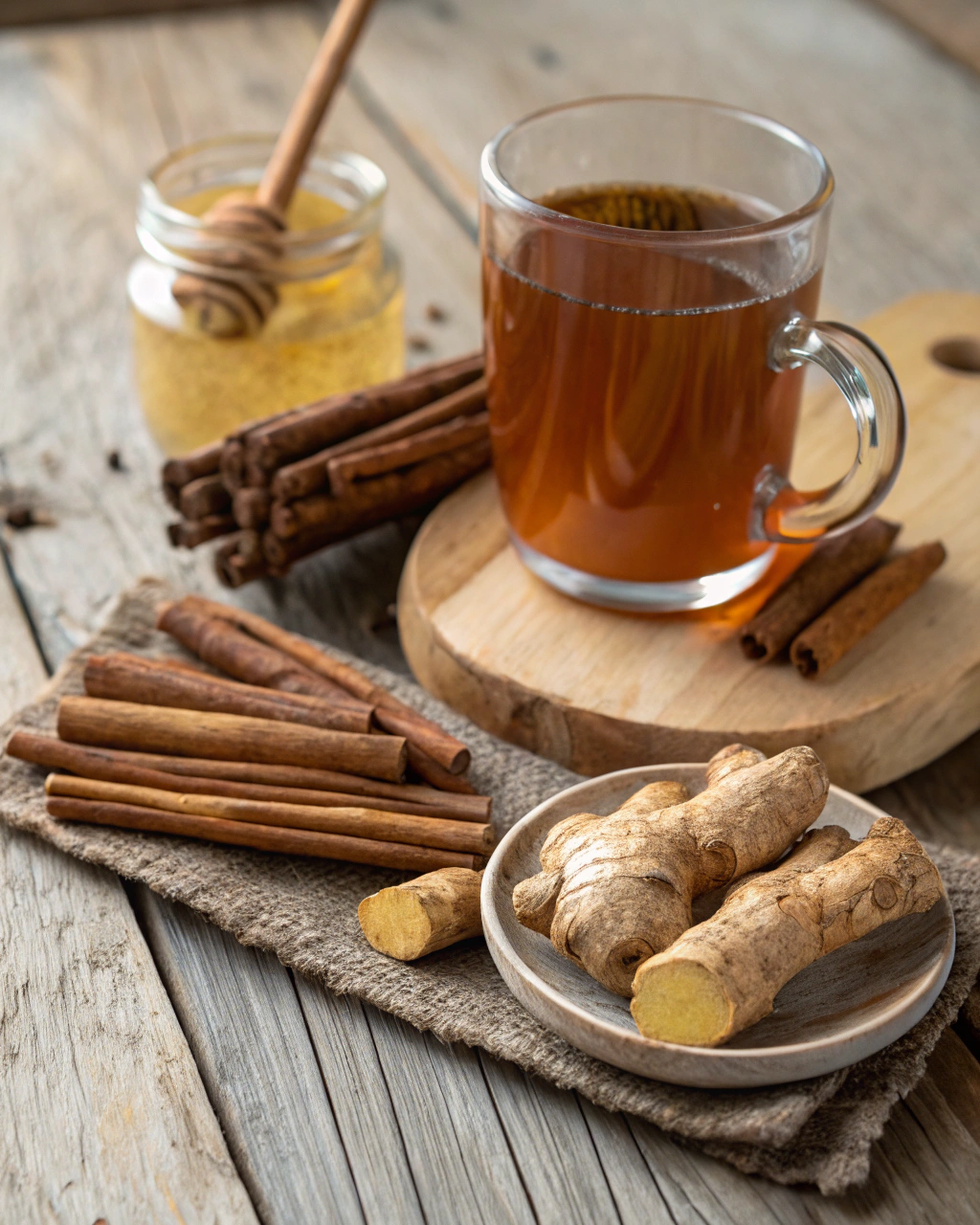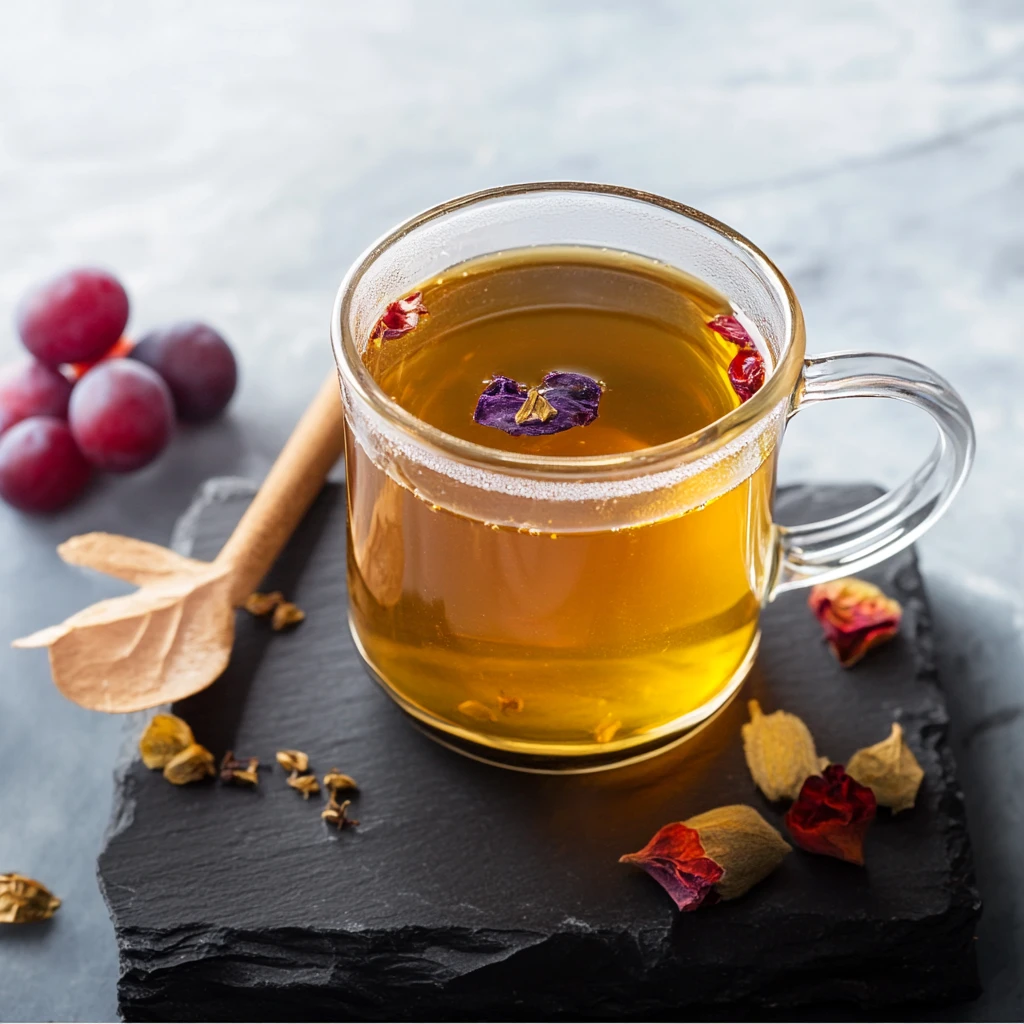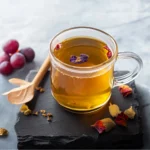Do you know that over 65% of people skip making homemade beverages because they assume it requires too much time? As a professional mocktail creator, I’ve dedicated my career to proving that quality drinks don’t need to consume your precious minutes. Today, I’m excited to share my 3-Minute Magic Method for creating a delightful berberine tea that’s both flavorful and efficient. This aromatic, golden-hued berberine tea brings together the earthy notes of Oregon grape root with warming spices and natural sweetness – all ready to enjoy in just minutes.
Table of Contents
External Resources for Perfect Berberine Tea
Before we dive into our recipe, I wanted to share some excellent resources that have informed my approach to crafting the perfect berberine tea. The Natural Mounjaro Recipe Brazilian-Inspired Herbal Drink offers fantastic insights on balancing herbal flavors. For those who enjoy spicy notes, the Ginger Lemon Paloma Mocktail provides excellent techniques for incorporating ginger. When working specifically with Oregon grape, Oregon Grape Recipes and Uses offers comprehensive information, while Herbal Digestive Remedies with Oregon Grape showcases traditional preparations.
Why Berberine Tea Matters for Busy Lives
In today’s fast-paced world, finding moments of calm can be challenging. A properly prepared berberine tea offers a moment of pause without demanding too much of your schedule. This particular beverage has been enjoyed in various traditional practices for centuries, but many modern recipes overcomplicate the process, making it seem inaccessible for daily enjoyment.
What scientific research says:
“According to studies published in peer-reviewed journals including Metabolism and Evidence-Based Complementary Medicine, berberine has been researched extensively for various traditional uses. Functional medicine practitioners often recommend berberine-containing herbs as part of wellness protocols, though individual results vary and professional guidance is essential.”
Naturopathic doctors suggest Oregon grape root as a natural berberine source Herbalists traditionally combine berberine herbs with warming spices Functional medicine practitioners often recommend taking berberine with meals Research indicates optimal absorption occurs with certain timing protocols
My approach to berberine tea embraces simplicity and efficiency. By streamlining the preparation process, you can incorporate this flavorful beverage into even the busiest schedule. The recipe respects traditional methods while acknowledging our modern need for convenience, offering a perfect balance between authentic flavor and practical preparation.
PrintBerberine Tea: Root Deep Nutrition and Wellness
This Perfect Berberine Tea is a quick, health-conscious drink that combines Oregon grape root with fresh ginger, natural sweeteners, and optional aromatic spices. The 3-Minute Magic Method ensures you can enjoy this flavorful, golden-amber tea in just minutes, making it perfect for busy mornings or afternoon refreshment.
- Prep Time: 1 minute
- Cook Time: 0 minutes
- Total Time: 3 minutes
- Yield: 1–2 servings 1x
- Category: Drink
- Method: No-Cook
- Cuisine: Health-Conscious
Ingredients
- 1–2 teaspoons dried Oregon grape root
- 1-inch fresh ginger, thinly sliced
- 1–2 teaspoons raw honey or maple syrup (optional)
- 2 cups filtered water
- Optional:
- 1 cinnamon stick
- Lemon slice
- Sprig of fresh mint
Instructions
- Prepare Your Ingredients: Thinly slice the ginger and measure out the Oregon grape root. Have your sweetener ready.
- Heat Water Properly: Bring water to just below boiling (about 190°F/88°C), where small bubbles form at the bottom of the pot.
- Quick-Infusion Technique: Place Oregon grape root and ginger in a teapot or heat-resistant vessel. Pour hot water over the ingredients using a circular motion, then cover immediately to trap heat and aromatics.
- Strain and Sweeten: Strain the tea into your cup using a fine mesh strainer. Add honey or maple syrup while the tea is still hot, stirring until dissolved.
Notes
Tips & Tricks for Perfect Berberine Tea:
- Slice Ginger Thinly: Use a mandoline or sharp knife for paper-thin slices to maximize flavor extraction during the quick steep time.
- Control Water Temperature: Avoid boiling water, as excessive heat can make the tea overly bitter. Aim for 190°F (88°C).
- Add Sweetener While Hot: Honey or maple syrup dissolve better in hot liquid, creating a smooth texture.
- Experiment with Optional Ingredients: Try adding a cinnamon stick, lemon slice, or mint sprig for added complexity.
- Prep Ahead: Slice ginger and measure ingredients beforehand for even faster preparation.
Nutrition
- Serving Size: 1 serving
- Calories: 30
- Sugar: 5g
- Sodium: 5mg
- Fat: 0g
- Saturated Fat: 0g
- Unsaturated Fat: 0g
- Trans Fat: 0g
- Carbohydrates: 8g
- Fiber: 0g
- Protein: 0g
- Cholesterol: 0mg
Ingredients for Perfect Berberine Tea
Ingredients
To create our quick berberine tea, you’ll need simple, accessible ingredients that work harmoniously to deliver a balanced flavor profile:
- 1-2 teaspoons dried Oregon grape root (the natural source of berberine compounds)
- 1 inch fresh ginger, thinly sliced (adds warmth and masks bitterness)
- 1-2 teaspoons raw honey or maple syrup (for natural sweetness)
- 2 cups filtered water
- Optional: 1 cinnamon stick (adds complementary warmth)
- Optional: Lemon slice (brightens the flavor profile)
- Optional: Sprig of fresh mint (for aromatic freshness)
What I love about this ingredient list is its flexibility. Can’t find Oregon grape root? Some specialty tea shops offer pre-packaged berberine tea blends that can substitute. Avoiding sweeteners? The cinnamon and ginger provide natural flavor without added sweetness. The vibrant ginger and optional aromatic mint create a sensory experience that elevates this simple beverage.
Ingredient Spotlight: The Science Behind the Taste
The success of this berberine tea relies on understanding how each ingredient functions:
Oregon Grape Root: The star ingredient contains naturally occurring berberine compounds that give the tea its distinctive golden-amber color and slightly bitter, earthy baseline. In the 3-Minute Magic Method, we use proper proportions to ensure flavor without overwhelming bitterness.
Fresh Ginger: Acts as a flavor counterbalance, providing warming notes that complement and mask the natural bitterness of Oregon grape root. The aromatic oils in ginger release quickly when sliced thinly, perfect for our quick preparation method.
Natural Sweeteners: Honey or maple syrup aren’t just for sweetness—they create body and mouthfeel that rounds out the flavor profile. Adding them at precisely the right moment (after brewing, but while the tea is still hot) ensures they dissolve completely without destroying their subtle flavor notes.
Cinnamon: Optional but recommended, cinnamon contains aromatic compounds that release quickly in hot water, providing immediate flavor without extended steep times.
Timing Breakdown: The 3-Minute Magic Method
- Prep Time: 1 minute
- Steep Time: 2 minutes
- Total Time: 3 minutes
- Serves: 1-2 people
My 3-Minute Magic Method for berberine tea is approximately 75% faster than traditional preparation methods, which often call for 10-15 minute steep times. Here’s how we achieve quality in a fraction of the time:
First 30 Seconds: Ingredient preparation and water heating
Next 60 Seconds: Quick-release infusion technique
Final 90 Seconds: Finishing touches and flavor balancing
This approach maximizes flavor extraction while minimizing wait time—perfect for busy mornings or afternoon refreshment breaks.
Step-by-Step Instructions
Step 1: Prepare Your Ingredients (30 seconds)
Thinly slice your ginger—aim for paper-thin slices to maximize surface area. Measure your Oregon grape root and have your sweetener ready. Pro tip: Use a mandoline for ultra-thin ginger slices if you have one on hand. The thinner the slices, the more flavor you’ll extract in our shortened steep time.
Common mistake: Using thick ginger chunks, which won’t release enough flavor in our quick method.
Step 2: Heat Water Properly (45 seconds)
Bring water just to the point where small bubbles form at the bottom of the pot (about 190°F/88°C)—not a rolling boil. This temperature is perfect for extracting flavor without making the berberine tea too bitter.
Chef’s secret: If you don’t have a thermometer, watch for the first small bubbles at the bottom of the pot, then remove from heat immediately. Water that’s too hot will extract excessive bitterness from the Oregon grape root.
Step 3: Quick-Infusion Technique (90 seconds)
Place Oregon grape root and sliced ginger in your teapot or heat-resistant vessel. Pour the hot water over ingredients using a circular motion to ensure even saturation. Cover immediately to trap the aromatic compounds and heat.
The magic happens here: Unlike traditional methods that require longer steeping, our quick-infusion technique focuses on maximum extraction in minimal time. The lid traps heat and aromatic compounds, accelerating the infusion process.
Step 4: Strain and Sweeten (15 seconds)
Strain the berberine tea into your cup using a fine mesh strainer. While still hot, add your preferred sweetener and stir until completely dissolved.
Timing tip: Don’t let the tea cool before adding honey or maple syrup—they incorporate much better in hot liquid, creating a silky smooth texture.
Pro Tips for Perfect Berberine Tea
Temperature Control: The ideal water temperature for berberine tea is just below boiling (190°F/88°C)—this extracts flavor without excessive bitterness.
Ingredient Order Matters: Always add the Oregon grape root to the pot first, followed by ginger and any additional spices, to ensure proper layering of flavors.
Timing Precision: Use a timer for exactly 90 seconds of steeping—longer isn’t better with this method.
Sweetener Selection: Raw honey complements the earthiness of berberine tea perfectly, but maple syrup offers a different dimension if you prefer its distinctive profile.
Presentation Shortcut: Keep pre-sliced ginger in the freezer—it maintains flavor while allowing you to skip a preparation step when making the tea.
Quick Variations & Dietary Adaptations
Lower-Sugar Version: Replace honey with a few drops of liquid stevia or monk fruit sweetener for those reducing sugar intake.
Kid-Friendly Twist: Add a splash of unsweetened apple juice and a cinnamon stick to mask the natural bitterness, making it more appealing for younger palates.
Party-Size Preparation: For gatherings, multiply ingredients by 6 and prepare in a large teapot or pitcher. Pre-slice all ingredients and keep ready for quick assembly.
Seasonal Adaptations:
- Summer: Add fresh mint and serve over ice with a lemon slice
- Fall: Include a cinnamon stick and star anise
- Winter: Add a pinch of warming turmeric and black pepper
- Spring: Incorporate fresh lemon balm or lemon verbena leaves
Behind the Recipe: Chef Marcus’s Story
The inspiration for this quick berberine tea method came during my travels through the Pacific Northwest. While visiting local herb farms, I noticed harvesters using flash-brew techniques that seemed to contradict traditional wisdom about lengthy steep times. Intrigued, I began experimenting with these methods back in my test kitchen.
What I discovered changed my approach entirely. Using precise water temperatures, ingredient preparation techniques, and timing, I could achieve comparable flavor extraction in a fraction of the traditional time. This berberine tea represents everything I love about my 3-Minute Magic philosophy—respecting tradition while acknowledging that modern life demands efficiency.
Perfect Pairings for Any Occasion
This berberine tea creates wonderful harmony with:
- Light Snacks: Unsalted nuts or rice crackers balance the slightly bitter notes
- Complementary Beverages: Serve alongside cucumber water for a refreshing contrast
- Breakfast Companions: Oatmeal or whole grain toast complement the earthy notes
- Dessert Option: Pairs beautifully with shortbread cookies or mild, unsweetened biscuits
For a complete non-alcoholic beverage spread, consider serving alongside my Quick Cucumber Refresh or Citrus Sparkler—both also made using the 3-Minute Magic Method.
Smart Storage & Batch Prep
Make-Ahead Components:
- Pre-slice ginger and store in an airtight container in the refrigerator for up to 5 days
- Measure Oregon grape root into individual tea filters for grab-and-go preparation
- Portion honey in small containers for precise sweetening
Storage Solutions:
- Freshly made berberine tea will maintain optimal flavor for up to 24 hours when refrigerated
- Store in glass containers rather than plastic to preserve the delicate flavor profile
- When reheating, warm gently—never bring to a boil as this alters the flavor
Scaling Up:
For events, prepare a concentrated infusion (double the Oregon grape root and ginger) and dilute with hot water as needed throughout your gathering.
Ingredient Information
Oregon grape root gives this tea its defining character with a naturally earthy, slightly bitter profile. The root contains berberine compounds that create the distinctive golden hue in your cup. Paired with ginger, the flavor transforms into a balanced, warming beverage.
The fresh ginger provides a pleasant spicy heat that wakes up your palate, while cinnamon adds aromatic complexity. These spices naturally complement the earthy base notes of the Oregon grape root.
Our preparation method ensures a smooth, pleasant drinking experience by balancing these natural flavors—the quick steeping time extracts the golden color and pleasant earthy notes without pulling too much bitterness from the Oregon grape root.
Serving & Presentation Ideas
Glassware Recommendations:
- Clear glass mugs showcase the beautiful amber color
- White ceramic cups create an elegant contrast
- Double-walled glass maintains temperature while protecting hands
Garnish Techniques:
- Float a thin slice of fresh ginger on top
- Add a small sprig of fresh mint for aromatic appeal
- Include a twisted lemon peel for citrus brightness and visual appeal
Occasion Matching:
- Morning refresh: Serve in a travel mug with extra ginger for awakening properties
- Afternoon moment: Present in a delicate teacup with a small cookie on the side
- Evening wind-down: Offer in a warmed mug with a cinnamon stick stirrer
Common Mistakes & Quick Fixes
Over-steeping: Results in excessive bitterness. Fix by adding an extra drizzle of honey and a squeeze of lemon juice to balance.
Under-extracting: Tea looks pale and tastes weak. Fix by adding a splash of ginger juice for immediate flavor enhancement.
Temperature too low: Flavors haven’t fully developed. Fix by returning to heat for 15 seconds—never microwave as this creates uneven heating.
Sweetener issues: Honey hasn’t fully dissolved, creating uneven sweetness. Fix by stirring with a warm spoon to help incorporation.
Flavor imbalance: Too much ginger heat. Fix by adding a small pinch of cinnamon to round out the spice profile.
⚖️ Medical Disclaimer:
“All health information mentioned is based on published research and traditional herbalist recommendations, not personal medical advice. According to healthcare professionals, berberine can interact with certain medications and may not be suitable for everyone. This recipe is designed for taste and traditional use only.
Before incorporating berberine-containing herbs into your routine, especially if you take medications or have health conditions, consult qualified healthcare providers who can review current research in the context of your individual situation. Pregnant and nursing women should seek professional guidance before using any herbal preparations.”
Frequently Asked Questions
How do you make berberine tea?
Making berberine tea is simple using Chef Marcus’s 3-minute method. Use Oregon grape root (a natural berberine source) – steep 1 tea bag or 1 teaspoon dried herb in 185°F water for exactly 90 seconds. Add fresh ginger, honey, and lemon juice to balance the naturally bitter taste. According to traditional herbalist practices documented in botanical literature, this temperature and timing extract beneficial compounds without creating excessive bitterness. Always use berberine-containing herbs from reputable sources, and consult healthcare providers before regular consumption, especially if taking medications.
What is the best way to take berberine?
According to research published in journals like Metabolism and Clinical Pharmacology, healthcare professionals typically recommend specific dosing protocols that vary by individual needs. Functional medicine practitioners often suggest taking berberine with meals to support absorption and minimize digestive upset, though exact recommendations should come from qualified healthcare providers who can assess your medical history and current medications.
From a culinary perspective, I’ve found that berberine-rich Oregon grape root tea tastes best when prepared with warming spices and natural sweeteners. However, for therapeutic dosing and timing, always consult with doctors or registered dietitians who can provide personalized guidance based on current research and your individual health status.
Does berberine reduce belly fat?
According to multiple peer-reviewed studies published in journals including Metabolism, Diabetes Care, and Evidence-Based Complementary Medicine, researchers have investigated berberine’s effects on various metabolic markers. Some clinical trials suggest potential impacts on body composition, though results vary significantly among individuals and study protocols.
However, these are research findings that require professional medical interpretation. Weight management involves complex factors that healthcare providers are qualified to address. While some studies indicate promising results, registered dietitians and endocrinologists emphasize that sustainable weight management requires comprehensive lifestyle approaches rather than single supplements.
This tea recipe focuses purely on creating a delicious, traditional herbal beverage – not weight loss promises. For evidence-based weight management strategies, consult healthcare professionals who can review current research in context of your individual situation.
What is berberine tea good for?
According to traditional herbalist literature and ethnobotanical studies, berberine-containing plants like Oregon grape root have been used in various cultural medicine systems for centuries. Modern research published in peer-reviewed journals has investigated berberine for multiple applications, with studies appearing in publications like Phytomedicine and Journal of Ethnopharmacology.
Healthcare professionals including naturopathic doctors, functional medicine practitioners, and clinical researchers have noted berberine’s traditional uses, though they emphasize that individual responses vary significantly. Current scientific literature suggests various potential applications, but medical professionals stress that research findings don’t automatically translate to universal recommendations.
From my perspective as a beverage creator, berberine tea made with Oregon grape root provides a warming, golden-colored drink with earthy, slightly bitter notes that pair beautifully with ginger and honey. The traditional preparation creates a satisfying herbal tea experience.
Important:
All potential benefits mentioned are based on published research and traditional use documentation, not personal medical advice. For specific health applications, consult qualified healthcare providers who can review current evidence and assess appropriateness for your individual circumstances.
Conclusion
berberine tea Final Result
The beauty of this berberine tea lies in its perfect balance between traditional ingredients and modern efficiency. Using the 3-Minute Magic Method transforms what was once a time-consuming process into a quick, achievable part of your daily routine without sacrificing quality or flavor.
The golden-amber berberine tea you’ve created captures the essence of Oregon grape root in perfect harmony with warming ginger and natural sweetness—all achieved in just three minutes. This approach embodies my philosophy that quality beverages shouldn’t require excessive time or complicated techniques.
Whether you’re seeking a morning ritual, an afternoon moment of calm, or an evening wind-down, this berberine tea delivers restaurant-quality results with home kitchen simplicity. The 3-Minute Magic Method proves that with the right techniques, traditional beverages can fit seamlessly into contemporary lifestyles.
Made this berberine tea? Share your 3-minute success story in the comments, rate the recipe, and tag us on Instagram and TikTok with #QuickMocktails — Chef Marcus might feature your creation in our community spotlight!
#QuickMocktails #3MinuteMagic #ChefMarcusThompson #NonAlcoholic #HealthyDrinks


